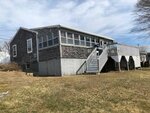



There’s a new reality for real estate agents selling homes in Manchester and Essex. Eight weeks ago, with the start of mass social distancing, it wasn’t clear what would happen to real estate sales. Now, it’s clear that COVID-19 has created an entirely “new normal” for how homes are viewed, put under agreement and sold, but if people thought sales would actually slow down locally, they’d be wrong.
In fact, despite challenges with sheltering in place—or perhaps triggered by it—interest in buying homes here has remained more than solid. According to mortgage closing and Registry of Deeds data, in April, 12 homes in Manchester sold ranging from $535,000 for a house on Pleasant Street to $3.2 million on Proctor Street, and in March, four homes changed hands. In Essex, nine houses sold in April, ranging from $505,000 on Pickering Street to $1.4 million on Island Road and five properties moved in March. For each town, the number of transactions is actually higher than the same months last year (March and April 2019 home sales in Essex were one and four, respectively and Manchester’s were three and seven.)
“We’re busy,” said Alice Miller of Coldwell Banker. “It’s different, for sure, in terms of how we work and we’ve adjusted. But people are definitely buying homes.”
Ida Doane, of J Barrett & Company, is busy as well. Doane said that the problem is one of inventory, not buyers. There are approximately 40 residential properties listed for sale in Manchester and just seven in Essex (including a parcel of land).
“If anything, it’s a seller’s market right now,” said Doane, who specializes in Essex. “In Essex we have just six single family homes on the market right now, and four of these are between $1 million and $3 million. There’s just not a lot for the middle level buyer.” The big changes have come with how properties are marketed and sold. In a matter of weeks, everything has changed, agents say, and many of those changes will be permanent. Virtual selling is front and center, like making the most of staging and photography, and creating a virtual open houses
Buyers are directed to online listings, and all showings are scheduled. If there is an open house, there are strict protocols.
Viewings are pre-screened, scheduled one at a time, prospects do not touch anything in the home, and they wear masks, gloves, and often booties, and everyone adheres strictly to social distancing. Everything is wiped down between showings.
“I joke that I’ve gone ‘from panic to power’,” said Kristin Francoeur, an agent with Engel + Volkers when describing the big adjustment to the new normal. At the beginning of COVID, Francoeur didn’t know what would happen. Then she started to hear from customers, and her work life stayed busy but changed to a new rhythm of Zoom calls and a different type of open houses.
Miller agreed. The changes to the operations at Coldwell Banker have been dramatic, but they were all coming prior to COVID. Now her office of 40 agents is used to it. Digital market re-ports. Digital showings. Digital offers. She said even Nanny Winslow, an Coldwell Banker agent who started in the Manchester office in 1978, is savvy with digital.
Besides, Doane said, there’s a silver lining to these new rules of social distancing and that’s the seriousness of buyers. There are no more “looky-loos” who go out on viewings for fun, she said. In a world of social distancing and protocols, she said, every person looking to buy a house is serious about buying a house.
“If they’re out and looking, it’s real,” Doane said. “Otherwise they wouldn’t do it.”
The new environment has also driven new levels of creativity. Two weeks ago agent J. Lucky Henry with Keller Williams Realty in Boston launched a campaign for his new listing for a con-dominium on Summer Street in Manchester. Coming from an out-of-town agency, he faced the challenge of breaking through. His answer? He focused on the most powerful differentia-tor of his listing—it’s the least expensive listing in Manchester—and he filmed a high energy video (“Manchester-by-the-Sea Jetpack Tour”) as a virtual open house which he broadcasted it on his OTT channel on YouTube. Since launching, the segment’s been seen nearly 200 times. It’s been a fresh new way to get people’s attention, especially young potential buyers in the market for a two-bedroom condo in a commuter town with a beach and a great school district.
In the end, these new tools don’t replace relationships and experience, the fundamentals of selling. If Henry’s “jetpack tour” gets buzz and eyeballs on his listing, which is a great tool, but he says it’s his hustle and pricing savvy that will sell his listing and those aren’t about technology. Doane agrees. “You learn about the new technology, but I find the most important asset I have is my relationships,” she said.
Besides, Doane is taking this all in stride. She began her real estate career in 1981 when she was selling home in an economy that saw 16 and 17 percent interest rates. COVID-19, she said, is actually a better challenge because it’s universal, an across the board issue that everyone understands has new rules, and a new normal. And she’s found it’s not too hard to adjust to the new reality of her job with one-at-a-time open houses, booties, masks and “don’t touch any-thing” rules for showings, and she’s just fine with meetings on Facetime and Zoom.